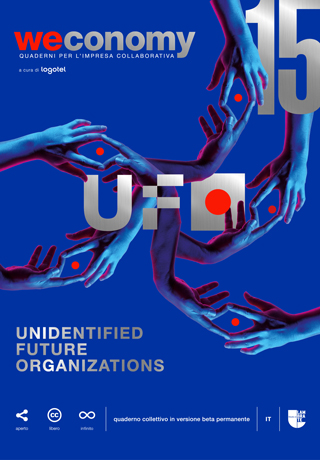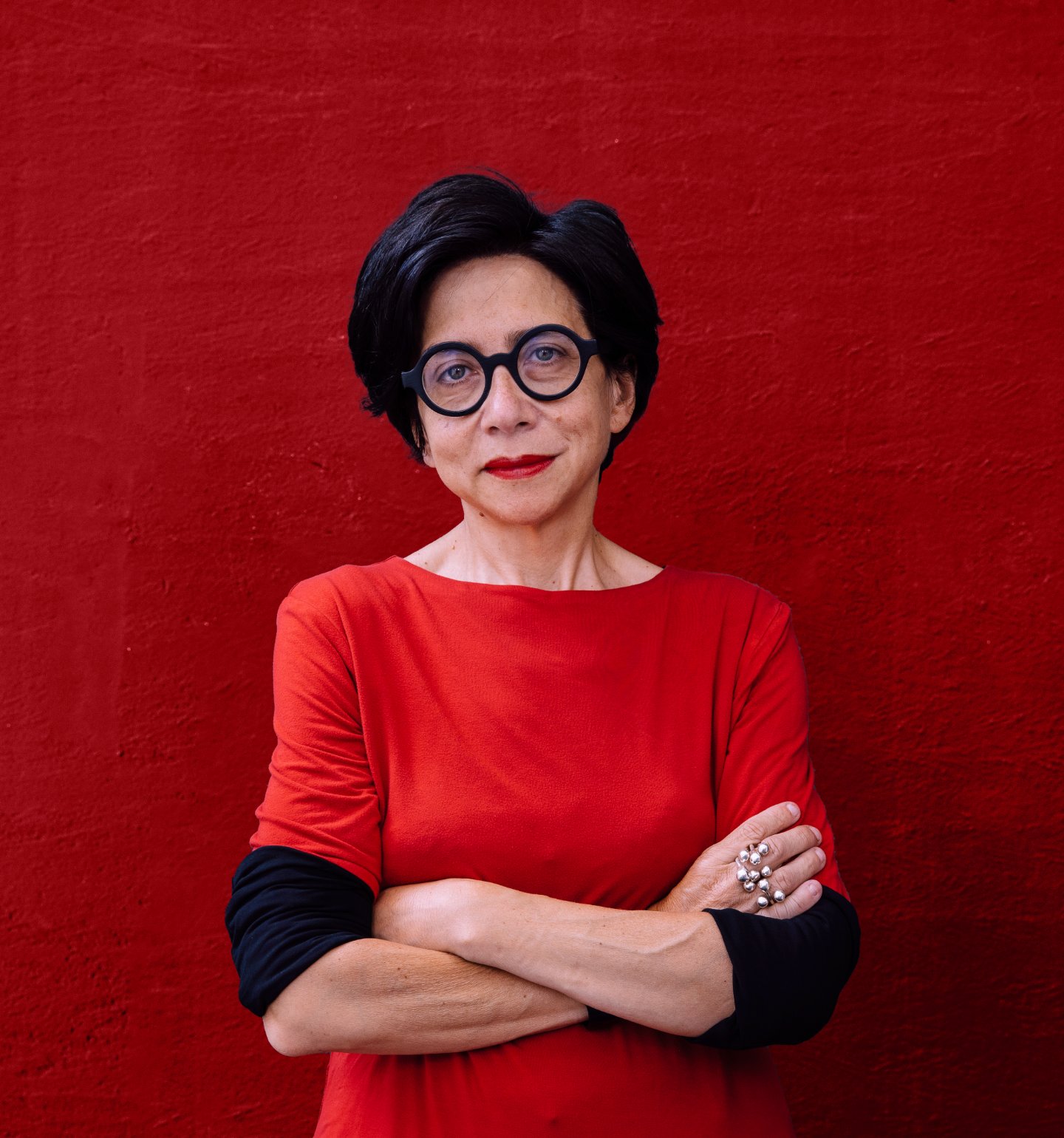Il quindicesimo numero di Weconomy, progetto di ricerca open source di Logotel, nasce da un’urgenza e da un desiderio. Perché è urgente prendersi il tempo di immaginare quale specie di UFO – quelle che abbiamo definito Unidentified Future Organizations, a cui questo numero monografico è dedicato – vogliamo essere o a quale vogliamo appartenere. È tempo di immaginare un altro mo(n)do, perché non possiamo perdere questa occasione. Il Covid-19 ha innescato trasformazioni profonde nel mondo del lavoro, negli ecosistemi di business, nelle relazioni tra persone e nel nostro rapporto con comunità e territori. Ci ha fatto ri-scoprire quanto siano preziose e fragili le connessioni che alimentano legami che, oggi, viaggiano senza barriere tra fisico e digitale, in un ambiente che Luciano Floridi chiama onlife. La scala di questi cambiamenti è tale da farci sentire inadeguati e per molti è forte la tentazione di affidarsi a qualche tecnologia salvifica. Ma attenzione: la tecnologia abilita connessioni, non forme di contatto. È quindi urgente fermarci e prenderci il tempo per immaginare quali nuove possibilità abbiamo davanti, per ispirarci verso un futuro che – certo – è ancora indefinito. Ma se lo affrontiamo a partire dai significati che vogliamo dare al lavoro, potremo superare una visione dell’economia che, già prima della pandemia, aveva molti elementi disfunzionali e molte forme di alienazione.
Indietro non vogliamo tornare
Dall’8 marzo 2020 abbiamo capito che “indietro non vogliamo tornare”. L’aumento delle distanze tra noi e gli altri ha modificato le norme sociali e ha cambiato il nostro modo di relazionarci, impattando sul modo in cui facciamo business. Ecco perché, in Logotel, per visualizzare potenzialità e rischi della modalità di lavoro che stava irrompendo nelle nostre vite, abbiamo da subito attivato un filone di ricerca, sperimentazione e progettualità dedicato al next-working. Immaginare quindi è urgente, ma non possiamo farlo da soli. Perché non dobbiamo trovare una ricetta perfetta, ma raccontare quali nuove strade stiamo affrontando come organizzazioni. Le imprese infatti stanno diventano reticolari e i ruoli manageriali e professionali si stanno trasformando. E possiamo osservare ciò in azione nelle realtà distribuite più mature, come GitLab, Automattic o Xero.
Tanti punti di vista per capire la portata delle grandi trasformazioni
Ed ecco il desiderio che ha animato il 15° numero di Weconomy: entrare in contatto con tanti più punti di vista possibile. Innanzitutto a partire dall’esperienza che abbiamo maturato come Logotel in questo periodo di eccezione, attraverso l’ascolto e la collaborazione continua con i nostri clienti e con le oltre 250 mila persone che popolano le oltre 42 business community che animiamo tutti i giorni. È il prezioso osservatorio dal quale guardiamo all’evoluzione molecolare dei cambiamenti nel mondo del lavoro ed è dove stiamo contribuendo a costruire un nuovo senso di appartenenza. E poi Weconomy si è aperto all’esterno, raccogliendo più di trenta testimonianze: dal business, dall’accademia, dal design.
Una nuova idea di comunità reticolari che danno forma a nuove specie di organizzazioni
È così che UFO ha dato vita un prisma di prospettive con un elemento comune: una nuova idea di comunità reticolari che danno forma a nuove specie di organizzazioni. Imprese in cui l’“experience lavorativa” è diversa, dove le relazioni e i legami tra persone diventano ancora più cruciali perché animano, danno forma e sostengono le comunità, che altrimenti si “sfalderebbero”. Reticolare, infatti, non significa solo incrementare la distribuzione del lavoro, ma far aumentare la diversità dei soggetti coinvolti, delle iniziative e degli scambi. Ogni snodo e ogni persona nella rete ha una sua influenza, quindi, che moltiplica le prospettive ma anche i divide. E quindi non è più sufficiente la polarizzazione tra il me/io e il super we/organizzazione, in mezzo ci sono tante we/ team da sostenere.
Sentiamo l’esigenza di capire meglio la portata di queste trasformazioni. Come siamo cambiati? Quali impatti sul nostro modo di lavorare, sulla nostra experience? Sul coordinamento? Come cambieranno i sistemi di apprendimento? Quale forma dovrà avere la nostra futura organizzazione? Quale nuova specie di “collante” dovremo alimentare per aumentare la coesione e il senso di appartenenza?
Le organizzazioni UFO sono indefinite, ma la nostra immaginazione non può esserlo
Per il design la capacità di immaginare è cruciale nella gestione di progetti trasformativi. Per creare qualcosa di nuovo e generare un cambiamento dobbiamo “saper vedere” il problema, per poi essere in grado di immaginare come le cose potrebbero essere diverse. Perché il futuro è un luogo, un appuntamento in cui la realtà che viviamo può essere proiettata verso una dimensione preferibile. Per dargli forma e creare un futuro (o futuri?) dobbiamo prima di tutto essere in grado di interpretare i cambiamenti nella loro ampiezza, immaginarne le implicazioni e “saperli far vedere” agli altri. E renderli così comprensibili, accettabili e attrattivi per tutti. E cioè inclusivi. Solo così guideremo e riusciremo a “mettere a terra” le nuove specie di organizzazioni. Perché le organizzazioni UFO sono indefinite, ma la nostra immaginazione non può esserlo. Deve partire da alcuni punti fermi, che riguardano le nuove forme di coesione; i nuovi ambienti collaborativi; reti di cura, e nuove forme di partecipazione alle grandi transizioni in corso.
1. Immaginiamo nuovi equilibri tra la libertà dei singoli e nuove forme di coesione
Uno dei cambiamenti più visibili nel nostro modo di lavorare riguarda la scomparsa di confini netti tra vita lavorativa e vita privata. Può generare nuove forme di burnout, ma è un’occasione per dar vita a una nuova armonia, che superi i ritmi tayloristici. Per attivare questa nuova visione abbiamo bisogno di un nuovo concetto, che è ben presente nelle organizzazioni UFO: le reti di influenza. Perché le vecchie gerarchie e le strutture di controllo non funzionano più. Cambiano quindi le forme di leader, che oggi abitano una zona intermedia tra “caos generativo e quiete dell’efficienza”. Ma non solo, ciò che fa vivere le organizzazioni UFO è la disponibilità e la capacità di entrare in contatto con tutto l’ecosistema, indipendentemente dai task assegnati ai singoli. È un concetto che può essere declinato in molte forme: a partire dalle responsabilità individuali nell’alimentare significati collettivi o attivando sperimentazioni continue che mettano al centro i team di lavoro, intesi come la vera dimensione della socialità; oppure attraverso un lavoro consapevole che faccia emergere tutta la conoscenza aziendale, rendendola pratica e riconoscibile. Ogni strada dà vita a una specie diversa di UFO, ma tutte hanno bisogno di un elemento sociale: i rituali. Sono elementi da progettare e costruire, perché danno il ritmo in un ambiente totalmente fluido. I rituali alimentano la dimensione partecipativa, permettono di imparare, trasmettono i significati e il valore. Danno forma alla collaborazione negli spazi ibridi che, altrimenti, è senza forma. Se non chiariamo questo aspetto, come faremo a fare il design delle nostre organizzazioni e dei nostri ecosistemi? È quindi necessario lavorare sull’experience dei servizi per i nostri clienti interni ed esterni, dei nostri spazi fisici e digitali di collaborazione.
2. Immaginiamo nuovi ambienti collaborativi
Quando ci imbattiamo nelle organizzazioni del futuro, leggiamo spesso la parola “ibrido”. È un termine che invita a mettere in relazione ambienti diversi (fisico e digitale, spazi individuali e luoghi collettivi, città e headquarter di multinazionali). Insomma, è qualcosa che apre a nuove possibilità, che deve essere esplorato a partire da una prospettiva di senso. Leggere le organizzazioni come un fatto estetico ci permette di capire se il lavoro che avverrà all’interno di questi spazi sia bello oppure no, prima che efficace o efficiente. La bellezza è un concetto relazionale perché induce le persone all’azione e quindi a collaborare. E, di conseguenza, a far accadere qualcosa di significativo, che spinge le persone a essere insieme in uno stesso luogo. E così lo spazio non è un luogo da riempire di oggetti, ma un ambiente che potenzia i legami tra gruppi di lavoro, anche per indugiare insieme ed essere consapevoli di quando è necessario separarsi (oggi, infatti, è importante riflettere anche su cosa siano gli “spazi personali”). Se recuperare la dimensione fisica negli ambienti è essenziale, anche quelli digitali non possono più essere pensati come piattaforme dedicate alla distribuzione delle informazioni, ma letti come comunità che veicolino scambi di valore. Ed ecco un’altra sfida: non limitarci a progettare forme di contatto al nostro interno, ma patire dalle dinamiche interno-esterno di cui si nutrono gli ambienti ibridi.
3. Immaginiamo come nutrire le reti di cura
L’antropologo sociale Thomas Hylland Eriksen ci fa notare che, con la pandemia, abbiamo imparato tanto sul digitale, ma ancora di più sul mondo fisico. E non solo a causa della nostalgia per gli eventi che ci ha colti durante i lockdown. Il mondo fisico è diventato un elemento di una rete più ampia e complessa, in un ecosistema di relazioni di cui dobbiamo prenderci cura e in grado di intercettare anche la dimensione della sostenibilità che implica una reinterpretazione complessiva dell’attività d’impresa. E quindi diventa fondamentale attivare una dinamica di ascolto e osservazione, per generare benessere all’interno delle organizzazioni; comprendere i nuovi bisogni dei clienti e allargare ancora lo sguardo, verso territori, comunità e specie che fanno sempre più parte di un business la cui ambizione è generare impatti positivi. È su questo livello che si intersecano la dimensione del change con quella del learning che – insieme – abilitano le persone a vivere il quotidiano e accompagnano il reshaping delle organizzazioni, come spiega Jessica Aroni nel suo contributo.
4. La grande transizione: ecco l’orizzonte più grande
Le nuove specie di lavoro si limitano quindi alle sperimentazioni per ottimizzare il numero di giorni da passare a casa e in ufficio? Oppure per scegliere la tecnologia migliore per supportare i modelli ibridi? No di certo. Immaginare le organizzazioni UFO è molto più profondo, non solo per il business e per migliorare la qualità della vita delle persone – e sono già sfide molto complesse. Per esempio, il passaggio a un modello di scambio di valore tra azienda e collaboratori one-to-one è la chiave fondamentale per acquisire, trattenere e sviluppare il best of breed nelle imprese, come sostiene Daniele Cerra nel suo articolo. Ma la posta in gioco è ancora più grande: introdurre elementi dinamici e creativi, in grado di attivare network di comunità per affrontare un mondo e un mercato che, nei prossimi anni, affronteranno enormi trasformazioni. Dalla transizione energetica, alla rivoluzione elettrica nella mobilità, alle città dei 15 minuti, fino all’importanza di far prosperare la dimensione economica insieme a quella sociale e ambientale. E questi sono solo alcuni dei grandi temi, pianeti da esplorare che non possiamo più non vedere.
Il 15° numero di Weconomy può farvi avvistare nuove specie – di collaboratori, organizzazioni, clienti e comunità – con cui entrare in contatto. Possiamo dirvi che, in Logotel, UFO ha generato una trasformazione, aiutandoci a inquadrare una nuova dimensione progettuale per un mondo reticolare, ibrido, online e sostenibile.





